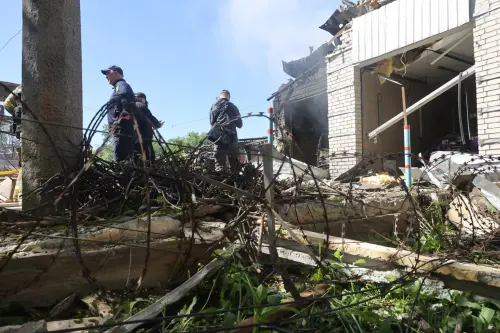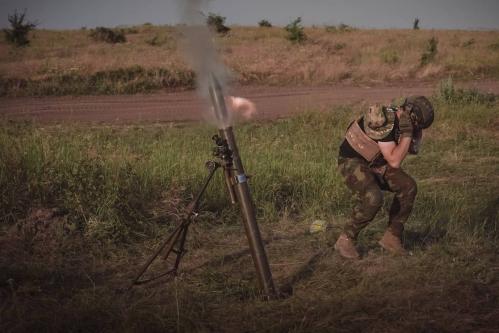A UN General Assembly non-binding resolution called the Crimea secession referendum invalid, while Russian forces continue to mass along Ukraine’s eastern border. Brookings experts continue to offer commentary and recommendations on the unfolding challenges. See previous editions of this roundup here, here, and here.
Brookings President
Strobe Talbott
took questions about the situation in a live Spreecast today. Addressing the possibility of a Russian invasion of Ukraine, Talbott put it in stark terms:
We are talking about bloody mayhem. If the Russians actually invade Ukraine it is quite clear that there are a great many Ukrainians who would be prepared to fight and die. And we could be looking at something not unlike what happened in Yugoslavia at the time that that country broke up.
And to make the matter even more complicated, the new leaders of Ukraine are going to have to do a lot of very careful vetting of the Ukrainian armed forces. Because the Ukrainian armed forces is heavily infiltrated by the Russian Federation. So we have multiple components here of chaos and God knows where it could lead.
We have the makings, particularly if Putin is so reckless or so self-confident as to invade Ukraine, that this could be perhaps the worst crisis we’ve faced since the Cuban Missile Crisis in 1962.
Listen to the archived Spreecast here.
Get out your maps, folks, so you know where Transnistria, Odessa & Donetsk are & can follow what may be most dangerous crisis since Cuba ’62
— Strobe Talbott (@strobetalbott) March 28, 2014
In a new article for Foreign Policy, Senior Fellow Steven Pifer, a former U.S. ambassador to Ukraine, writs that the March 21 sanctions on Bank Rossiya “have sent shock waves through Russian business and financial circles.” He continues:
In the intervening days, hundreds of thousands of Russians have lost access to Visa and MasterCard services. Russian oligarchs have stopped boasting that they are on the U.S. blacklist as international bankers and have begun to shy away from their businesses — and their access to credit dried up while their stock prices tumbled. Russian owners of mining, metals, energy, financial services, engineering, and defense firms are now terrified that sanctions on their sectors are next.
Now that the financial sanctions that the United States and its allies in the European Union imposed on Russia after its illegal annexation of Crimea are beginning to work, the challenge is to not relax, but rather to increase the pressure until Ukrainian sovereignty is solidified. In 2008, following the Russian-Georgian war, the West took similar steps to punish Russia for violating the territorial integrity of a sovereign neighbor, but subsequently relaxed them, implicitly accepting Putin’s fait accompli and setting a precedent for another attack, this time on Ukraine. The West must now prove it has learned from that mistake. The regime of international sanctions that the United States and Europe imposed has real bite, and they must stay in place, and increase, until clear objectives are met, ensuring the new Ukrainian government in Kiev is on solid political and financial ground.
Bruce Jones, author of the new book Still Ours to Lead, says that the U.S. and western allies need “the cooperation of emerging nations to avoid a new cold war stalemate.”
The U.S. can drive a western coalition to respond to Russia, but it’s not enough. The actions and reactions of China and India and the rest of the emerging powers will matter, too. So far, they’re torn: they’re not at all happy with Russia’s adventurism in Crimea (witness China’s unwillingness to join Russia in vetoing the U.N. Security Council resolution condemning the action). But nor are they comfortable with the reassertion of western leadership in international affairs. Their discomfort arises from this fact, too: for all that we hear about the rise of the rest, the rise of the BRICS, the shift of power away from the West, the fact is that the West—the U.S., the E.U., key western allies like Japan—still control roughly 70 percent of the global economy.
So are we watching the emergence of a G7 versus BRICS world?
Read the full piece on The Daily Beast.
Here is some of what Brookings scholars are saying on Twitter:
Noticing some people say 1) an invasion of Ukraine wld be a disaster 4 Russia, AND 2) the Ukr mil is a shambles so US can’t give assistance
— Tom Wright (@thomaswright08) March 28, 2014
These two statements are not strictly contradictory but definitely in tension w/ each other
— Tom Wright (@thomaswright08) March 28, 2014
Putin’s put us in a new era already w/ Crimea grab, but if, as seems likely, he invades eastern Ukraine, we’re in a far more dangerous one.
— Strobe Talbott (@strobetalbott) March 28, 2014
To be taken VERY seriously: US Intel sees Russian invasion of eastern Ukraine likely. http://t.co/dik0QqNG4b
— Strobe Talbott (@strobetalbott) March 28, 2014
Questions about #Ukraine? Submit them now to http://t.co/0wSs62Naa2 … and @WSJSolomon and I will answer them live at 11am EST
— Strobe Talbott (@strobetalbott) March 28, 2014
First Crimea, now Alaska. Where will Putin stop? | http://t.co/UJK2ETqkPR petition seeks to return Alaska to Russia http://t.co/Dn2NjxUdH9
— Mike Doran (@Doranimated) March 28, 2014



Commentary
Brookings Scholars on the Ukraine/Crimea Crisis, 3/28/14
March 28, 2014